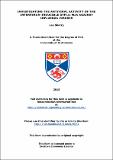Investigating the antiviral activity of the interferon-inducible GTPase MxA against influenza viruses
Abstract
The interferon (IFN) system forms an essential part of the innate immune response,
up-regulating hundreds of IFN-stimulated genes (ISGs) in response to viral infection.
A key protein in this response is the human myxovirus resistance protein MxA, an
IFN-induced GTPase with broad-spectrum antiviral activity, capable of inhibiting
many RNA and DNA viruses. One of the most studied antiviral effects of MxA is the
inhibition of influenza A virus replication, yet the molecular mechanism of antiviral
activity is still unknown. Influenza A viruses are inhibited by MxA at two distinct
stages of viral replication; during viral entry and following primary transcription of
viral mRNAs. The antiviral effects of MxA during viral entry are highly dependent on
IFN, however activity exerted after primary transcription can occur in the absence of
IFN. This study provides evidence that MxA exerts its antiviral activity at these two
stages of viral replication through distinct mechanisms, and outlines a potential model
of MxA antiviral activity following primary transcription. A potential third antiviral
mechanism of MxA is proposed based on the findings that MxA is able to regulate
cellular lipid metabolism, thereby potentially affecting virion composition. Mutational
analysis of MxA highlights the significance of GTPase activity to the antiviral effects
of MxA, while also demonstrating that natural single nucleotide polymorphisms in
MxA have the potential to severely impair or prevent antiviral activity. Finally, this
thesis shows for the first time that MxA exhibits antiviral activity against influenza B
viruses. Overall this thesis provides new information illustrating how MxA provides
potent antiviral activity against influenza viruses. Such information is vitally
important as understanding the molecular basis of how proteins such as MxA function
against many human pathogens is fundamentally important in our efforts to create
better long-term treatment options for all viral diseases.
Type
Thesis, PhD Doctor of Philosophy
Rights
Creative Commons Attribution-ShareAlike 4.0 International
http://creativecommons.org/licenses/by-sa/4.0/
Collections
Except where otherwise noted within the work, this item's licence for re-use is described as Creative Commons Attribution-ShareAlike 4.0 International
Items in the St Andrews Research Repository are protected by copyright, with all rights reserved, unless otherwise indicated.


